- Grades 6-12
- School Leaders
Learn How to Support Stressed and Anxious Students.

Field Trip Reflection Sheet (Free Printable)
Make your time outside the classroom meaningful.
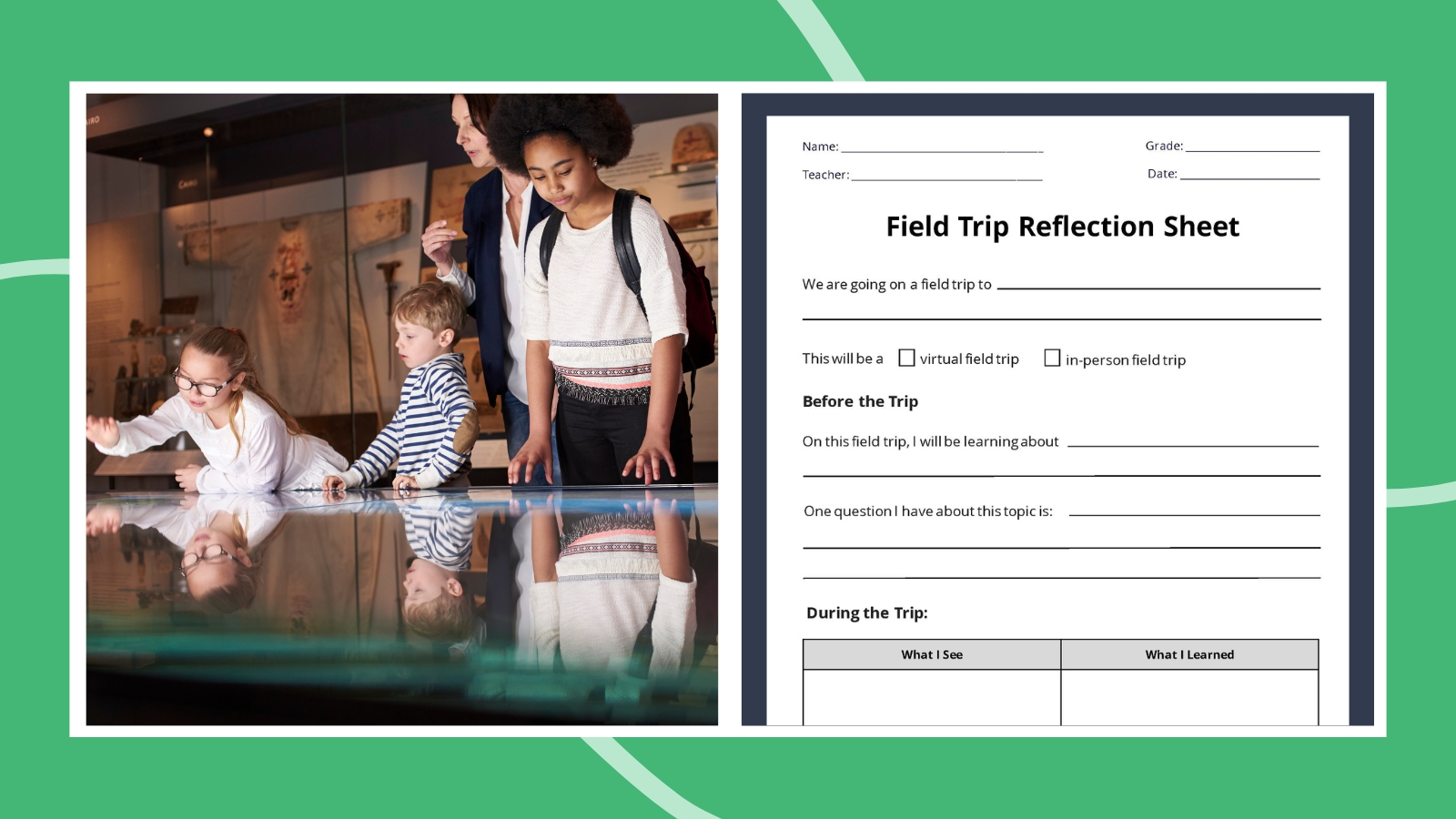
Field trips are amazing! They give kids the chance to explore a new place, learn more about specific topics, talk to experts, and see demonstrations and examples you just can’t do at school. Whether you’re taking a field trip to a local library or zoo or you’re participating in a virtual field trip to a space center or aquarium, you’ll want the field trip to be a pivotal learning experience. That’s where our Field Trip Reflection Sheet comes in.
The impact field trips have on students often has to do with how they engage with the information they learn. Incorporating a field trip reflection worksheet helps students focus on what’s important to them and what it means for their learning and life. Get the free Field Trip Reflection Worksheet by simply filling out the form on this page .
What kind of reflection sheets are in the bundle?
You’ll find two field trip reflection sheets, one for elementary schoolers and one for middle and high schoolers. Each reflection sheet works for either in-person or virtual field trips.
Elementary School Field Trip Reflection Sheet
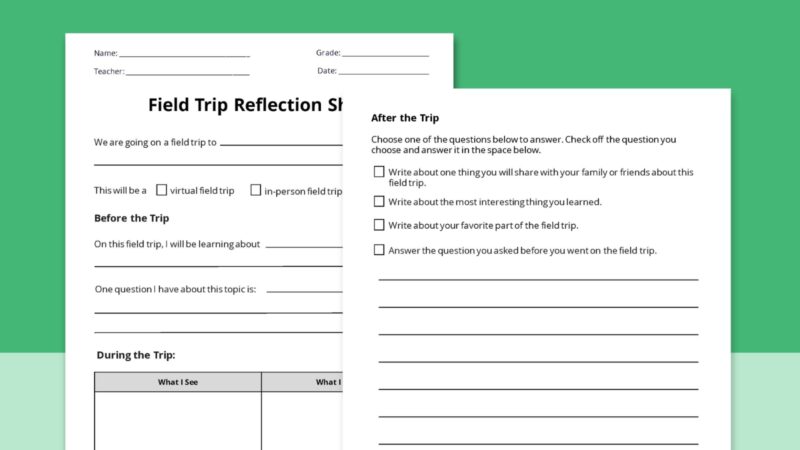
Elementary schoolers can identify where they are going and what they are going to learn about before they head out of the building or log in to the field trip. Then, during the field trip, students record observations and information they learn. After the trip, students choose one response as a reflection to help consolidate their learning.
Middle and High School Field Trip Reflection Sheet
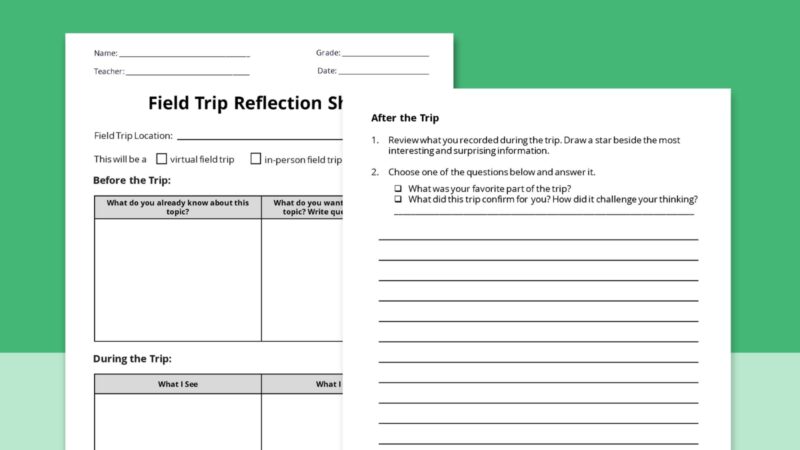
Before the trip, older students activate background knowledge so they’re primed to connect new information with what they already know. Once on the trip, they record observations and information. After the trip, students can choose a question or answer a teacher-directed question to consolidate what they learned.
What are some field trip reflection questions?
Here are ideas for field trip reflection questions that you can incorporate into the Field Trip Reflection Sheet:
- What was the most important thing you learned on today’s field trip?
- What should someone else know about this topic?
- What was your favorite part of this field trip?
- Who else would enjoy this field trip and why?
- How does the information you learned on today’s field trip connect with what you already knew?
- What is one way that the information you learned today confirms what you already knew? What is one way that it challenged what you already knew?
- In five years, what will you remember from this field trip?
Use the Field Trip Reflection Worksheet as a way to keep students focused. You can also use it as an exit ticket or assessment after the trip. This is especially helpful for field trips that require parent chaperones as you can see what students were doing during the trip and provide some accountability for students’ learning.
Get your free Field Trip Reflection Sheet printable!
To get your free printable bundle, just fill out the simple form on this page for instant access.
Need field trip ideas? Check out these 260+ field trip ideas (in-person and virtual).
You might also like.
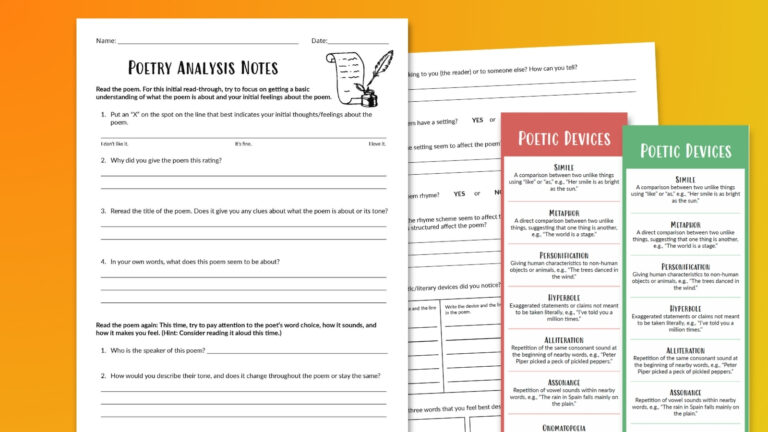
Poetry Analysis Worksheet and Bookmarks (Free Printables)
Make thinking deeply about poems easy with these fun, thought-provoking questions. Continue Reading
Copyright © 2024. All rights reserved. 5335 Gate Parkway, Jacksonville, FL 32256

Home / Printables & Worksheets / Field Trip Log Printable For Organized Outings (FREE DOWNLOAD)
Field Trip Log Printable For Organized Outings (FREE DOWNLOAD)
Embarking on a field trip is more than just an escape from the four walls of a classroom ; it’s a journey into real-world learning and discovery. However, capturing these moments and the wealth of knowledge gained during excursions can often feel like trying to hold water in your hands—elusive and fleeting.

That’s where the power of a well-crafted field trip log printable comes into play. This indispensable tool anchors the learning experience and transforms fleeting moments into lasting educational treasures .
By leveraging this simple yet effective strategy, educators and students can ensure that every discovery, question, and insight is meticulously documented, turning ephemeral experiences into enduring lessons.
What Is Field Trip Log?
A field trip log is a structured document or booklet for students during educational outings. It enables them to record observations, thoughts, and learnings in real time.
It is a personalized account of their experiences, capturing details about the places visited, activities engaged in, and insights gained.
By encouraging active participation and reflection, the field trip log enhances the trip’s educational value, making learning more interactive and memorable.
It bridges experiential learning outside the classroom and curriculum goals, fostering deeper understanding and retention of the subject matter.
About Field Trip
A field trip is an educational journey that takes students from the traditional classroom setting to explore the world around them, offering a hands-on learning experience across various domains.

Whether students immerse themselves in the beauty of fine arts, unravel the mysteries of history, serve the community through volunteer work, embark on exhilarating outdoor adventures, or simply have fun while learning, field trips are designed to enrich their educational journey.
The goal is to better understand and appreciate subjects through real-world exposure, foster critical thinking and social skills, and enhance academic learning with practical experiences .
Field trips make learning vivid and memorable, connecting classroom knowledge with real-life applications and encouraging students to engage with their surroundings meaningfully.
Field Trip Brainstorm
Field trip brainstorming is a creative and engaging process where educators and students collaborate to generate exciting and educational outing ideas.
This fun adventure in learning involves thinking outside the box to come up with trips that are not only informative but also captivating and memorable.

The key is balancing educational objectives with adventure and enjoyment elements, ensuring each trip offers a unique learning opportunity.
Tips for successful brainstorming include considering a variety of destinations, integrating curriculum goals, and focusing on experiential learning aspects that can enhance students’ understanding and curiosity.
By encouraging input from all participants, the brainstorming session can uncover hidden gems and foster a sense of ownership and excitement about upcoming educational adventures.
Fabulous Field Trips
Creating fabulous field trips requires creativity, planning, and exploration. Homeschool days can significantly enhance the experience, providing tailored educational content and a more intimate learning environment.
Commit to going on at least one outing, which can spark curiosity and excitement for future trips.

Start by writing down all possible destinations, considering both conventional and unconventional places that could offer rich learning opportunities.
Don’t hesitate to contact local businesses and organizations; many are eager to support educational initiatives and can offer unique insights or private tours.
Remember, the core of a successful field trip lies in its ability to be fun and engaging. Mix educational goals with interactive and hands-on activities to ensure students learn and thoroughly enjoy the experience.
With these tips, each field trip can be a memorable adventure that enriches students’ educational journeys.
Field Trip Destination And Date
For an effective field trip planning document, include a section dedicated to “Destination and Date” that outlines the specifics of the trip. This should encapsulate the goals of the outing, such as enhancing understanding of a particular subject or building team cohesion.

Detail the trip’s theme, which could range from historical exploration to science in action, providing a focused lens through which the trip is viewed.
Venue details are crucial: include the location, contact information, hours of operation, and any special instructions or requirements (e.g., dress code, items to bring).
After the trip, it’s beneficial to add notes reflecting on the experience—what aspects were successful and what elements didn’t work as anticipated.
This could include feedback on the venue’s educational value, logistics like timing and transportation, and the overall engagement and response from the participants.
Recording these observations will be invaluable for planning future field trips , allowing for continuous improvement and tailoring experiences to meet educational goals effectively.
Field Trip Checklist
A field trip checklist is an essential tool for ensuring a smooth and successful outing. It comprises a comprehensive list of tasks categorized by priority.

- Top Priorities include securing permissions and forms, confirming the date and transportation, and finalizing the destination details. These non-negotiable steps must be completed well to ensure the trip’s feasibility.
- Must-Do Tasks involve detailed planning, like creating an itinerary, arranging meals or snacks, and preparing educational materials or guides relevant to the trip’s theme. Safety measures, such as first-aid kits and emergency contact lists , also fall under this category.
- Should-Do Tasks include pre-trip briefings with students and parents, organizing volunteers or chaperones, and considering accommodations for special needs. While more critical than the must-dos, these tasks significantly enhance the field trip experience.
Options In Field Trip
When exploring options for a field trip, several key aspects must be considered to ensure the outing is both educational and logistically feasible.

Learning Points cover the trip’s educational objectives and curriculum ties, highlighting what students are expected to learn or experience. Depending on the destination, this could range from historical knowledge to scientific processes.
Fees or Expenses detail the cost involved per student, including entry fees, workshop costs, or donation suggestions. Transparently outlining these expenses helps plan and ensure all participants can afford to join.
Travel and Meals encompass the logistics of getting to and from the location and food arrangements. This could involve booking buses, planning routes, and deciding whether students should bring packed lunches or if meals are provided.
Daily Hours indicate the start and end times of the trip, including any specific check-in times at the venue, to assist in scheduling and adherence to school timelines.
Notes offer space for additional observations or requirements, such as dress codes, items to bring, or special instructions for participants. This section can also record feedback after the trip to inform future planning.
Carefully considering these elements ensures that each field trip is enriching, enjoyable, organized, and accessible to all students.
Importance Of A Well-Structured Field Trip Log
A well-structured field trip log is crucial in maximizing the educational benefits of field trips, turning them from mere excursions into profound learning experiences. Here’s why:
- Enhances Learning Retention: Students engage in active learning by documenting observations and reflections. Writing down what they see, hear, and do helps cement the information in their memory, enhancing retention and understanding of the subject matter.
- Promotes Critical Thinking: A structured log encourages students to analyze and question their experiences. Reflecting on what they learned and how it connects to their prior knowledge fosters deeper cognitive processing and critical thinking skills.
- Encourages Engagement and Participation: Students who might be passive observers can become active participants by filling out their logs. This engagement ensures that they are physically present and mentally and emotionally invested in the learning experience.
- Provides a Tangible Record: The log is a personal record of the learning journey, which students can refer to for future projects, exams, or personal reflection. It becomes a tangible artifact of their educational experience outside the classroom.
- Facilitates Assessment and Feedback: For educators, field trip logs are invaluable tools for assessing learning outcomes and student engagement. They offer insights into each student’s understanding and perceptions, allowing personalized feedback and support.
- Supports Curriculum Integration: Well-structured logs help bridge the gap between experiential learning and curriculum goals. They can be designed to focus on specific learning objectives, ensuring that the trip aligns with and enhances the broader educational agenda.
Conclusion
Incorporating a well-structured field trip log transforms educational excursions into deeply impactful learning experiences. It reinforces knowledge, enhances critical thinking, and ensures active engagement and meaningful reflection.
By serving as a bridge between hands-on experiences and curriculum objectives, the field trip log maximizes the educational value of field trips.
As educators and students navigate the complexities of learning outside the classroom , the field trip log stands out as an essential tool, turning every journey into a lasting lesson and every observation into an opportunity for growth.
Frequently Asked Questions
What is a field trip log.
A field trip log is a document or booklet students use during educational trips to record observations, reflections, and learnings. It’s structured to guide students through documenting their experiences, ensuring they engage with and reflect on the trip’s educational content.
This tool enhances learning retention, promotes critical thinking, and fosters a deeper connection with the subject matter.
Why Is A Field Trip Log Important?
A field trip log is important because it turns the experience into a rich learning opportunity. Students can better retain information, understand complex concepts through real-world examples, and develop critical thinking skills by actively documenting the trip.
It also provides teachers with valuable insights into students’ learning and perceptions, facilitating personalized feedback and support.
How Should A Field Trip Log Be Structured?
A well-structured field trip log typically includes sections for pre-trip expectations, on-site observations and activities, and post-trip reflections.
This structure guides students through the learning process, from anticipating what they will learn to reflecting on their experiences and understanding. Including prompts or questions related to the trip’s objectives can further enhance its educational value.
Can Field Trip Logs Be Used For Assessment?
Yes, field trip logs can be a valuable tool for assessment. They provide tangible evidence of student engagement and learning, allowing educators to assess the factual knowledge gained and critical thinking, observational skills, and reflective capacities.
By reviewing logs, teachers can gauge students’ understanding of the subject matter and their ability to connect experiences to curriculum goals.
How Can Field Trip Logs Be Incorporated Into Classroom Learning?
Field trip logs can be integrated into classroom learning as a basis for discussions, presentations, or further research projects. Students can share their observations and reflections with peers, fostering collaborative learning and deeper exploration of the subject.
Logs can also be referenced in future lessons, connecting experiential learning with ongoing curriculum topics, thus enriching the educational experience.
- Recent Posts
- 47 Tarot Magic Coloring Pages For Kids & Adults (FREE DOWNLOAD) - April 26, 2024
- 47 Celestial Harmony Coloring Pages For Kids & Adults (FREE DOWNLOAD) - April 26, 2024
- 47 Kittens Galore Coloring Pages For Kids & Adults (FREE DOWNLOAD) - April 26, 2024
Leave a Comment Cancel Reply
Your email address will not be published. Required fields are marked *
Save my name, email, and website in this browser for the next time I comment.
Over 6,200 homeschool resources and growing!

Free Field Trip Worksheet Templates & Logs
Published: January 8, 2015

Contributor: Sarah Shelton
Disclosure: This post may contain affiliate links, meaning if you decide to make a purchase via my links, I may earn a commission at no additional cost to you. See my disclosure for more info.
Did you know that you can count your field trips as school hours or a even a full school day? I like to keep track of all of our trips with a homeschool field trip log and keep them in each student’s portfolio.

We like to track all of our field trips and add them to our end of the year portfolio. Not only does it document what we have learned it is fun to look back on and see the places we have gone. Then it becomes a scrapbook of sort.
I like to include any pamphlets, maps or educational handouts that we received at our field trips. This really helps add to the learning experience of the field trip.
Field trips enhance learning.
Field trips are amazing learning experiences. I enjoy finding field trips that accompany whatever we are studying in our homeschool. I make a point to make sure I plan a few learning field trips throughout the year that go with what we are learning.
It helps to make learning come alive for my kids. My older kids have fond memories of visiting historical sites, museums, zoos, even our local fire station. They learn so much when they can be immersed into a specific place or location.
Their senses are enhanced and they seem to soak up all of the information and retain it. I love watching their brains click when they can see something right before their eyes that we read in a book
Printable Homeschool Field Trip Logs:
If you are wanting to start tracking your field trips you must check out this list of field trip logs.
Printable Field Trip Log – There are two versions of this log. One that you can print out and write on, or an editable version where you can write directly on the computer.
Field Trip Log – This field trip log has spaces for 11 field trips. You can record them by subject and by how many hours you spent on that field trip for that subject.
Homeschool Field Trip Log – Simple log great for early elementary aged kids to record their thoughts about the field trip they just took.
Scrapbook Style Log – This log looks like a personal scrap book page and will look darling in a portfolio.
Student Field Trip Form – There are even spots for kids to draw pictures of what they saw and like best about the trip.
Printable Field Trip Journal – Your kids will get a chance to share what they did and did not like and even sketch a few things about their experiences.
Free Printable Field Trip Journal
Our subscribers have access to a field trip journal pack that is full of worksheets that you can use to record your homeschool field trips. You can download it as well as dozens of other homeschool freebies in our subscriber library .

Field Trip Notebooking Pages:
Since I like to make sure most of our field trips are educational, notebooking pages are always a great idea. Do you take a whole day off from school to take a field trip? If so, then you can pull these notebooking pages out at the end of the day.
Your children will enjoy reflecting on what they have learned and recording it for “school”.
Field Trip Reflection Notebook – This free notebook has portrait and landscaping field trip pages for your child to record in.
Zoo Fieldtrip Worksheets A zoo is a popular field trip location. These individual worksheets and notebooking pages are for toddlers up through sixth grade.
Create your own Field Trip Notebook – Have your kids learn how to create and keep their very own notebooking journal just for all the fun field trips they will take.
Field Trip and Travel Journal – These notebooking pages create a wonderful keepsake to record what your children have learned and where they went, the places they traveled and what they saw along the way.
Virtual Field Trips:
Have you ever used the computer to go on a virtual field trip? With most of the world shutting down for a year, many families took advantage of virtual field trip opportunities. You won’t want to miss all these fun ideas!
List of amazing virtual field trips – This is a great list that also comes with printable virtual field trip logs and a map to mark where you have visited online.
10 Virtual Field Trips for Elementary Aged Children – Another great list of virtual field trips to take from the comfort of your own home.
How to Make the Most of Virtual Field Trips – Be encouraged to take virtual field trips and find out how to turn them into amazing learning experiences in this article.
32 Virtual Field Trips for American History – Are you diving into American History this year? Use this list of field trips to add to your history learning experiences.
Sarah Shelton
Sarah is a wife, daughter of the King and Mama to 4 children (two homeschool graduates) She is a an eclectic, Charlotte Mason style homeschooler that has been homeschooling for over 20 years.. She is still trying to find the balance between work and keeping a home and gardens. She can only do it by the Grace of God, coffee and green juice
Related resources
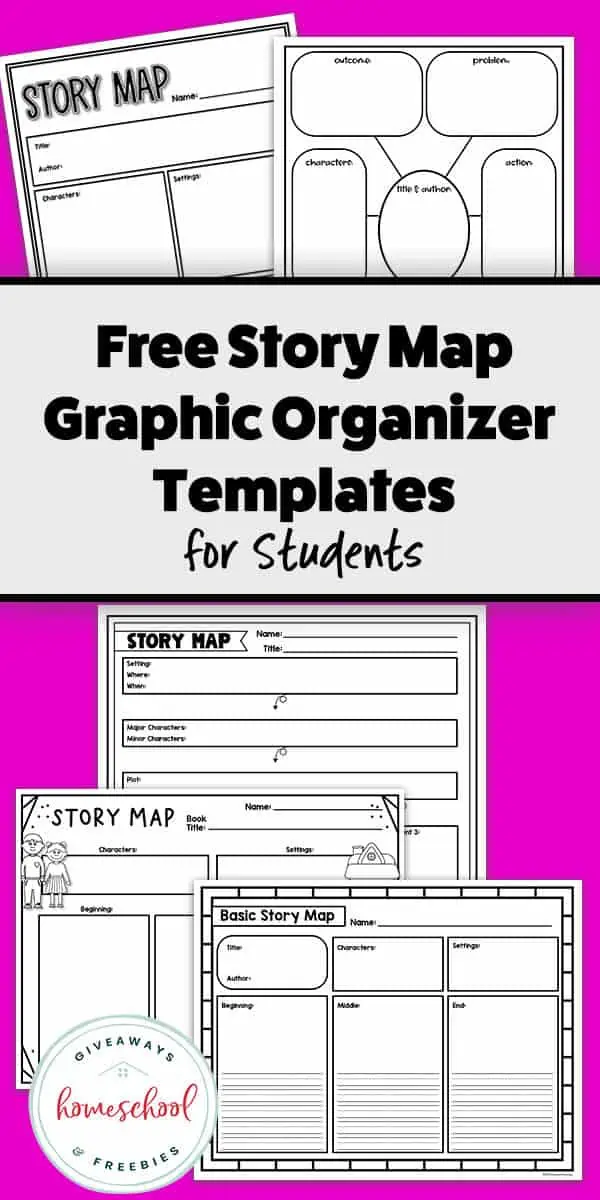
Free Story Map Graphic Organizer Templates for Students
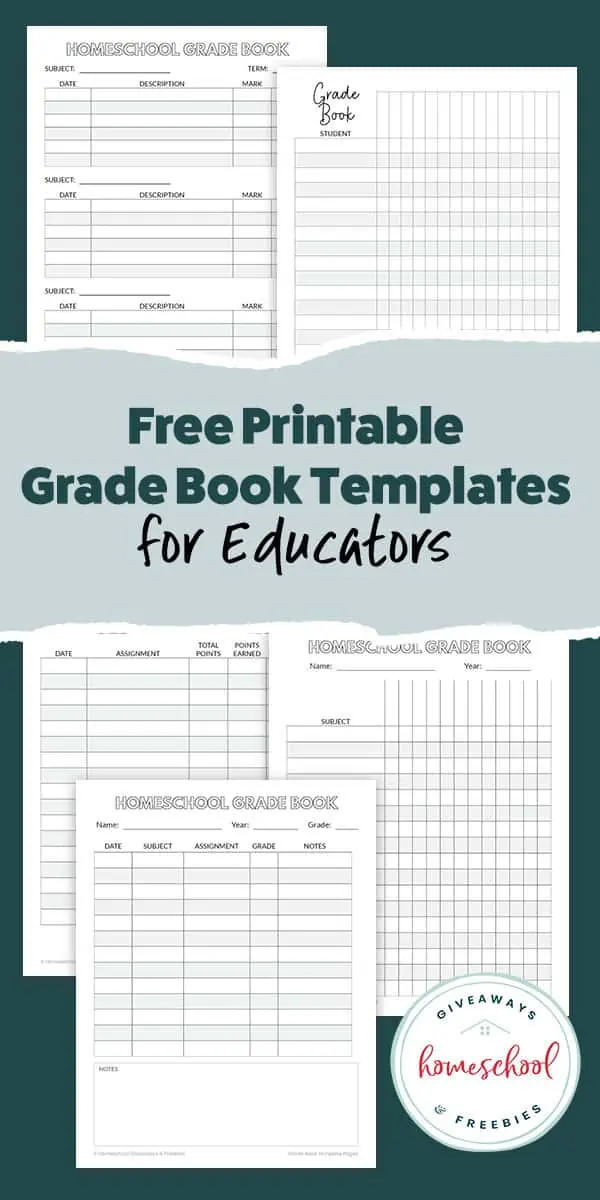
Free Printable Grade Book Templates for Educators

What Homeschoolers Need to Know About College Scholarships
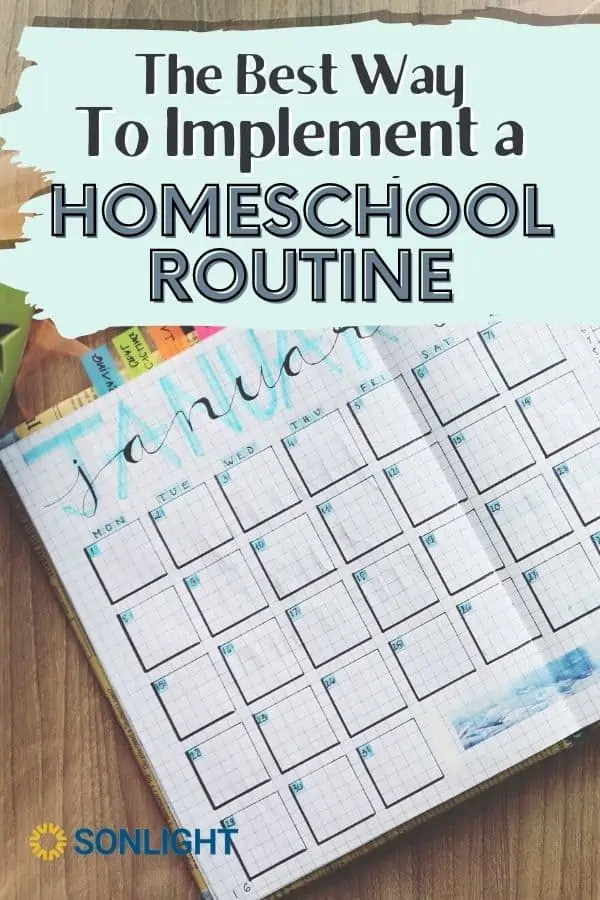
The Best Way to Implement a Homeschool Routine
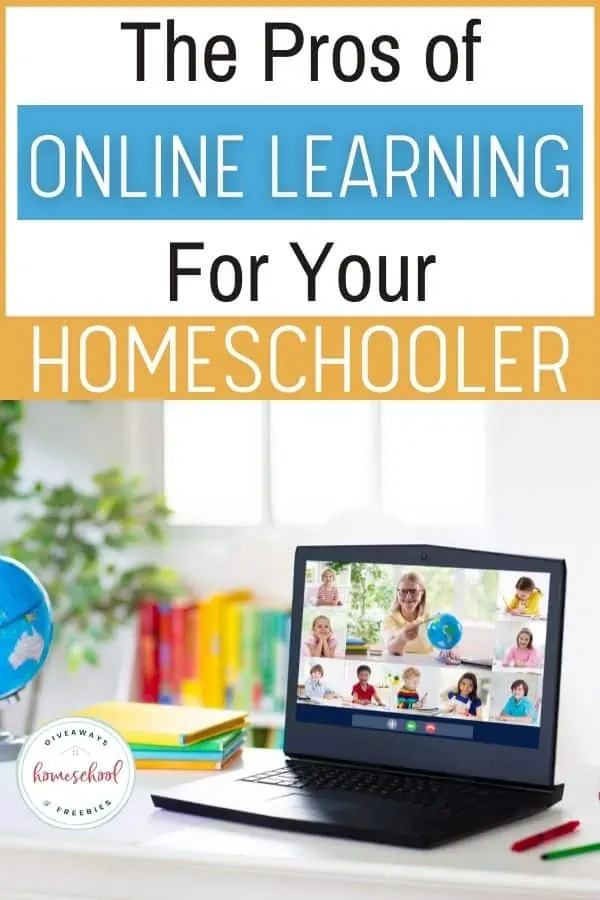
The Pros of Online Learning for Your Homeschooler
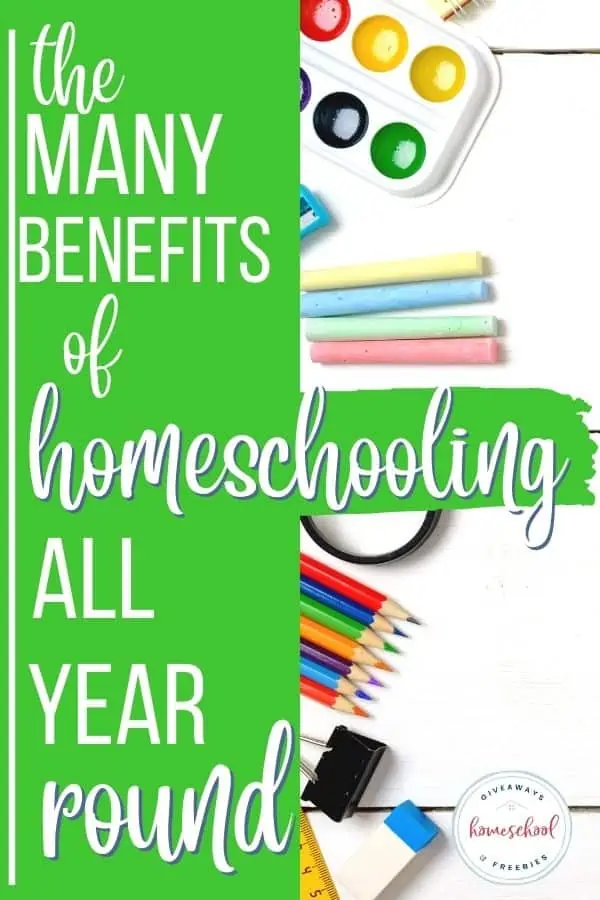
The Many Benefits of Homeschooling All Year Round


Classroom Q&A
With larry ferlazzo.
In this EdWeek blog, an experiment in knowledge-gathering, Ferlazzo will address readers’ questions on classroom management, ELL instruction, lesson planning, and other issues facing teachers. Send your questions to [email protected]. Read more from this blog.
Response: Leveraging Field Trips to ‘Deepen Learning’

- Share article
(This post is Part Two in a three-part series. You can see Part One here .)
The new “question-of-the-week” is:
How can teachers maximize the learning potential of field trips?
In Part One , Jennifer Orr, Herb Broda, Anne Jenks, Russel Tarr and Andrew Miller shared their answers to this question. You can listen to a ten-minute conversation I had with Jennifer, Herb and Anne on my BAM! Radio Show . You can also find a list of, and links to, previous shows here .
Today, Ron Berger, Camille A. Farrington, Gail Desler, Abby Schneiderjohn, and Mike Janatovich contribute their thoughts.
Response From Ron Berger
Ron Berger, a teacher for more than 25 years, is chief academic officer for EL Education and an author of several books including Learning That Lasts and Leaders of Their Own Learning :
When I was a kid I loved field trips. The promise of a day of adventure in the “real world"—not another day sitting at our desks — was as close as I was going to get to Disneyland. It hardly mattered where we were going and what we were doing: the possibility was exciting. The fact that these field trips were not leveraged to deepen our learning (in fact, they were often disconnected entirely from our studies) was not something that even occurred to me.
In second grade we visited a dairy farm. A real farm! We were not studying farms or cows, but there had been a story in our reading textbook about a dairy farm, and evidently this trip was a yearly tradition. We weren’t complaining. When our school bus arrived in front of a real red barn, we clambered down and boarded a miniature train with tiny, kid-sized seats and no roof, and we cheered as the train chugged its way past smelly pigpens and pastures of cows. It was only as an adult that I looked back and questioned this: a train on a dairy farm? (I guess hosting tours supplemented the small farm’s income). What we remembered most was the chocolate milk we got to drink at the end of the tour--from glass bottles!
Fieldwork instead of Field Trips
At EL Education we use the term fieldwork , rather than field trips. This is not just a semantic difference. Fieldwork is not sitting on a miniature train looking at sites, and it’s not just taking a tour of an historic home or walking through an aquarium. Fieldwork is what adult professionals do: research in the world. It may happen to take place in an historic home or an aquarium, but the students are not there as passive listeners. They are there to conduct research for their studies: taking notes, taking photos, interviewing experts.
An EL Education middle school in Cooperstown, New York, did their fieldwork on local dairy farms. It was very different from my second-grade field trip. As part of a year-long science/humanities learning expedition on agriculture, students studied the fundamental change in their community as the local economy shifted away from centuries of farming toward the tourist industry. They met and interviewed the local dairy farmers and worked in teams to visit their farms and learn in detail about their history and their current areas of success and challenge, from a farming perspective and business perspective.
The students created a book to share with the community to honor the farms and families that were the historical foundation of the local economy. They did scientific research on the farms to create a guide to the vertebrates and invertebrates that shared the farm ecosystems with the domestic animals. (The teacher leader of this expedition, Amy Parr, was chosen as New York State’s Agriculture in the Classroom Teacher of the Year for 2013). For students, this was a transformational educational experience.

What makes this type of fieldwork different from traditional field trips?
Students travel to places that are integral to what they are studying . The travel is not seen as a break or a reward but an opportunity for important learning.
Students have an important purpose — a mission — for every trip. They are collecting information to create something of quality and value to share with others.
Students are deeply prepared ahead of time with expertise in what they will be seeing and whom they will be meeting. They arrive excited to see in real life the things and people that they have learned about.
Students are actively engaged on site in interviewing experts and collecting information : taking notes, photos, videos, sample measurements. They are scientists and historians, not passive visitors. They are trained and prepared to collect information politely, effectively and wisely.
- Students return to the classroom with a charge to use their data and the learning to create something meaningful. The fieldwork experience does not end when the bus returns to school: the class reflects on what they learned, how they behaved and worked together, and how they will make good use of the fieldwork in their work.
Going Deeper
A memorable example for me of the power of fieldwork was when it transformed a class of first graders at the Mary O. Pottenger Elementary School in Springfield, Massachusetts. The teacher, Chris Scibelli, was a talented veteran teacher who had a tradition of bringing her students on a field trip to Sturbridge Village as a part of a study of Colonial America. Sturbridge Village is a restored colonial village where craftspeople of all types demonstrate colonial trades as characters in period costume. Chris’s students always loved seeing blacksmiths, weavers and coopers in their workshops.
When Pottenger first joined the EL Education network, Chris was understandably skeptical about changing her practices. She was already a very successful teacher, and her routines and practices worked fine. She kept her skeptical eye but was willing to give this new approach a shot. With EL support, she redesigned her colonial study into a more full learning expedition which would culminate in her first graders creating a picture book for kindergartners: a “Then and Now Book of Colonial Life.” The book would have writing and student drawings to teach younger students about how daily life was different during colonial times.
That year her students took the usual trip to Sturbridge Village, and students were excited as always to meet the actors/craftspeople. This year, however, they had a different mission: they each had to choose a colonial craft or trade about which they would become an expert. One week later, the class returned to Sturbridge Village for a second trip, and this trip was entirely different: small groups of students, with a parent or teacher helper, spent the entire visit in one workshop, learning from one craftsperson, interviewing, taking notes (adults helped with note-taking), photographs, and samples as that craftsperson worked with visitors.
I visited the classroom when students were working intently on their book and was amazed by their knowledge. Every first grader knew more about a colonial trade or craft than I did. They were bursting with knowledge to explain, stories to tell, photos to share. They were truly little experts. While the unit on Colonial America had been successful in the past, this year it was a wholly different level of success. This was the power of fieldwork.
You can see what fieldwork looks like in a diverse urban school, King Middle School in Portland, Maine, in this video .
Fieldwork and Experts: The Branching Out Expedition at King Middle School from EL Education on Vimeo .
Response From Camille A. Farrington
Camille A. Farrington is a Senior Research Associate and Managing Director at the University of Chicago Consortium on School Research, where she studies how schools contribute to human development. Before earning her Ph.D. and becoming a member of the Mindset Scholars Network , she was a high school teacher for 15 years. She still loves going on field trips!
You became a teacher because you want to make a positive difference in your students’ lives, right? Well, field trips are wonderful opportunities to provide students with critical developmental experiences that have lasting impact, so design them for that purpose!
Last year, my colleagues and I at the University of Chicago Consortium on School Research scoured the literature and interviewed experts in neuroscience, education, and psychology to understand how young people develop the factors that matter most for life and work success. In Foundations for Young Adult Success: A Developmental Framework , we describe five ACTION experiences and five REFLECTION experiences that are as important for kindergarteners as they are for high school students. All are important to keep in mind as you design out-of-school adventures for your class.
The next time you take your students on a field trip, make sure you build in rich opportunities to: encounter new places, concepts, people, roles, and perspectives; tinker with things or ideas in a low-stress environment; practice behaviors or skills to build expertise and confidence; choose among options for how to engage or what to learn; and contribute to something they value.
These five ACTION experiences provide awesome opportunities for growth and development, but by themselves they aren’t enough. Students might run around a science museum pushing buttons or crowd around an incubator watching baby chicks hatch, but then leave without having really learned anything. That’s because, as John Dewey reminded us, “We don’t learn from experience, we learn from reflecting on experience.”
To maximize the potential of field trips, intersperse action experiences with REFLECTION experiences. As much as they need to engage in doing, students also need opportunities to: describe their observations; evaluate strategies, behaviors, or solutions; connect their experience to other things they know or care about; envision how their experiences or discoveries might be helpful in the future or might apply in another context; and integrate what they’ve learned or done into the kind of person they might want to be.
Last spring I accompanied a group of high school students on a two-hour field trip, organized by Embarc Chicago , to a small business that sells fresh salads through vending machines . The students were greeted by employees who told them the salad company was debating whether to locate vending machines in Garfield Park, a low-income Chicago neighborhood. They asked students to help them conduct some research—and then distributed colored pencils, maps of Garfield Park, and lists of all the grocery stores, liquor stores, restaurants, and fast food places in the neighborhood. Students worked in small groups, marking the location of each business on their maps, then comparing Garfield Park to a map of the affluent Lincoln Park neighborhood with food places already colored in. Students then debated whether or not Garfield Park could be considered a “food desert,” using a definition provided by their teacher.
Next, the class broke into groups and rotated through opportunities to: interview company owners about their backgrounds and business plans; compete in pairs to see who could use a diagram to stock the vending machines most quickly, and then evaluate the strategies each team used; and to create and name their own salads, choosing from some 40 different ingredients. To close the visit, students ate their salads and reflected on what they learned—how it connected to other trips they had taken or other things they were studying. I was impressed that Embarc organizers included all 10 developmental experiences in two short hours!
Powerful field trips provide young people with opportunities to engage in meaningful activities and to make sense of those experiences—to actively build their story of how the world works and how they fit into it. Next time you bring your students into the field, use the developmental experiences framework as your planning guide!

Response From Gail Desler
Gail Desler is a technology integration specialist for the Elk Grove Unified School District in Elk Grove, Calif. She also serves on the advisory committee for the California K12 High Speed Network (K12HSN), a state program funded by the California Department of Education for the purpose of providing educators, students and staff across the state with access to the high speed network needed to videoconference. Beyond the school day, she co-curates the Digital ID Project , a global microphone for students to speak out on digital citizenship issues:
Whether it’s in preparation for, or as a follow-up to, or instead of a real-time field trip, videoconferencing is an amazing digital tool for maximizing the learning potential of field trips. I’ve been tapping into the power of videoconferencing for over 10 years, connecting students with authors, poets, soils engineers, astronauts, park rangers, other classrooms, and more. Yet for as unlimited as the possibilities for videoconferencing are, it is surprising how few educators are taking advantage of this technology.
Eleven years ago, I rented a district van and drove a group of students from a continuation high school over to California State University, Sacramento, so they could virtually meet with students from a continuation high near Santa Barbara. These two groups had already been blogging on the topic of a banned book: Luis Rodriguez ‘ “Always Running, Gang Days in East L.A.” Minutes into the videoconference, Luis Rodriguez joined us from somewhere in Los Angeles. Weeks later, the students were still discussing and blogging about—when they didn’t have to—the virtual field trip, an experience that, given the distances, would not have been possible in real time.
Soon after the CSU Sacramento/UC Santa Barbara event, renting a bus or van was no longer necessary. By purchasing a Tandberg videoconferencing camera, I was able to bring videoconferencing directly into the classroom. Taking students on virtual field trips to California’s State Parks via the Parks Online Resources for Teachers and Students (PORTS) , for instance, has increasingly become an integral part of the school day. As you can see from this videoconference on the life cycle of monarch butterflies or this videoconference to a California Gold Rush town , it’s a two-way flow of information, with students learning from the park rangers, but also becoming active researchers and investigators as they share their understandings and growing expertise on the topic.
Today, a (pricey) videoconferencing camera is a thing of the past. Using any device with a webcam, teachers and students can take virtual field trips with free programs such as Skype or Google Hangouts. A visit to NASA , PORTS , National Parks , Skype , or CILC will provide you with a glimpse into the many ways to prepare for, create, or extend field trip teaching and learning options.
Recently, a tech support person from my department shared that he had started out one very rainy morning at an elementary school site, helping the teacher set up a webcam for a videoconference with NASA. He noticed the level of student engagement and participation, and would have enjoyed staying for the full 40-minute session, but he had to get to another elementary site. He arrived at the next school in time to find four classes waiting in the rain for buses that were apparently delayed. He, of course, felt the need to suggest to the teachers, “You might want to look into taking virtual field trips. No buses, no permission slips, no hassles.”
It is wonderful to have the budget for real-time field trips. However, if we structure virtual field trips in ways that allow students to connect and collaborate with each other, as well as with the experts, then virtual field trips can certainly be the next best option—or sometimes even the better learning option.

Response From Abby Schneiderjohn
Abby Schneiderjohn (@aschneiderjohn) is an elementary school teacher in San Jose, CA. She is beginning her seventh year of teaching and implementing Project Based Learning this year. She is also a Buck Institute for Education National Faculty member:
When some hear the words “field trip,” they probably imagine uncomfortable bus rides, semi-organized chaos, frustrated chaperones, and logistical nightmares. When planned intentionally, a field trip becomes an authentic and rich learning experience for all students, and not just a reason to get out of the classroom for the day.
An engaging entry event is an integral part of planning a Project Based Learning unit. It hooks the learners, sparks curiosity, and launches inquiry. When using a field trip as an entry event, it provides the real life context needed for students to make connections from their work in the classroom to its implications in the real world.
Katherine Smith Elementary School second graders launched their “Kid Inventors” project with a trip to The Tech Museum of Innovation in San Jose, Calif. They participated in a science lab, Physics of Roller Coasters, which had them test different laws of physics using an engineering design process. When students returned to the classroom, their Need to Know questions were rich with vocabulary that they learned during the field trip. The field trip gave them essential background knowledge and language that helped them access the PBL curriculum. Bringing the learning to life is especially important for our English Learners, as it gives students another opportunity to use academic vocabulary in context.
When planning an engaging field trip, there are some additions you can include to increase the rigor of the trip! One addition can be a note taking guide or scavenger hunt. This will help you as the teacher direct your students to look for certain things during the field trip. If possible, use technology such as iPads or tablets to have students take pictures and/or record their experience. You can even make it public by having students blog about the experience afterward!
When you hear the words “field trip” again, I hope you think of the rich, authentic learning experiences they can truly provide for our students!

Response From Mike Janatovich
Mike Janatovich is the assistant principal of Harmon Middle School in Aurora, Ohio, and an ASCD Emerging Leader :
The field trip is, in my opinion, one of the most important learning opportunities that students can experience in school. It is an opportunity for them to become immersed in something that will expand or solidify their learning. Within an educational setting, we must maximize the learning potential by allowing actual learning to take place. An “educational setting” is not just contained to the classroom. An educational setting should and must be all the areas of the world that students can access.
When I am on a field trip, I cringe when I see students carrying a clipboard with a worksheet that they have to complete on a field trip. To me, this is not learning. This can be done from home on a Google search. Wherever you are going, or whatever place you are visiting, we must let kids experience it. If we require every student to do the exact same thing on a field trip, are individual students really “experiencing” it? I fully understand having a focus on a field trip, but after that initial focus, we must let kids explore. Allow kids to think, discover, and experience wherever you might be visiting.
As educators we need to be prepared to recognize that all the intended “standards” might not be covered, but this is OK. If we allow student choice and are excited about something, I can guarantee you that students will learn. It will be up to us as educators to harness it. I once heard an educator say in the Smithsonian American History Museum, “Don’t go into that exhibit, that is a 9th grade standard”. How about let them experience that part of the museum that they find exciting and have them compare it to what they are learning in 8th grade? How about using social medial to allow students to document their experience? These are small things, but critical if we want kids to fully maximize their potential while exploring the world on a field trip.
Most field trips fall short when the field trip ends. Too often, field trips are seen a culmination or a reward at the end of a unit/year. When this happens, we cut the learning short. Upon returning from field trips there must be follow-up conversations. All students to share and discuss what they experience. To deeply cement learning, use the experience to create. Have students contact the designer of the monument, curator of the museum, naturalist at the park, or whoever plays a key role where you visited and have the students questions that were created after they visited. Even try to let this turn into a Skype call or a Google Hangout. Imagine your students experiencing something and then having the opportunity to discuss it on a deep level. Even if they do not respond, the act of formulating questions for a real audience will deeply motivate students.
Keep one question in mind in the entire field trip process (planning, visiting, follow up): Are my students experiencing the field trip? If you make your field trip an experience for students, learning will happen. Standards will be covered, and if they are not, the skills they learned will make students stronger critical thinkers that will allow them to dive deeper into all learning in the future.

Thanks to Ron, Camille, Gail, Abby, and Mike for their contributions!
Please feel free to leave a comment with your reactions to the topic or directly to anything that has been said in this post.
Consider contributing a question to be answered in a future post. You can send one to me at [email protected] .When you send it in, let me know if I can use your real name if it’s selected or if you’d prefer remaining anonymous and have a pseudonym in mind.
You can also contact me on Twitter at @Larryferlazzo .
Anyone whose question is selected for this weekly column can choose one free book from a number of education publishers.
Education Week has published a collection of posts from this blog -- along with new material -- in an ebook form. It’s titled Classroom Management Q&As: Expert Strategies for Teaching .
Just a reminder—you can subscribe and receive updates from this blog via email or RSS Reader. And, if you missed any of the highlights from the first five years of this blog, you can see a categorized list below. They don’t include ones from this current year, but you can find them by clicking on the “answers” category found in the sidebar.
This Year’s Most Popular Q & A Posts!
Classroom Management Advice
Student Motivation & Social Emotional Learning
Implementing The Common Core
Race & Gender Challenges
Best Ways To Begin & End The School Year
Brain-Based Learning
Teaching Social Studies
Project-Based Learning
Using Tech In The Classroom
Parent Engagement In Schools
Teaching English Language Learners
Student Assessment
Reading Instruction
Writing Instruction
Education Policy Issues
Differentiating Instruction
Math Instruction
Science Instruction
Professional Development
Teacher Leadership
Administrator Leadership
Relationships In Schools
Instructional Strategies
Author Interviews
I am also creating a Twitter list including all contributers to this column .
Look for Part Three in a few days...
The opinions expressed in Classroom Q&A With Larry Ferlazzo are strictly those of the author(s) and do not reflect the opinions or endorsement of Editorial Projects in Education, or any of its publications.
Sign Up for EdWeek Update
- Book 1,199,000+ Hotels, Apartments, B&B and Hostels!
- Hotel's currency

Elektrostal'
- Book Hotels
- Moscow region
- Elektrostal' hotels
- UytHome on boulevard 60-letiya Pobedy
Choose dates to see prices
Price (per night).
- 0 US$ - 50 US$ 61
- 50 US$ - 100 US$ 12
Star Rating
Guest rating.
- Air Conditioning 7
- Restaurant 7
- Swimming Pool 2
- Bathtub/Shower 4
Property Type
- Apartment 50
- Guesthouse 2
- Condo Hotel 1
Sights in Elektrostal'
Central Air Force Museum 17 km.
Saturn Stadium 28 km.
Ramenskoye Bus Station 29 km.
Ramenskoye Train Station 29 km.
Balashikha Arena 31 km.
Airports in Elektrostal'
Zhukovsky International Airport 33 km.
Moscow Domodedovo Airport 54 km.
UytHome on boulevard 60-letiya Pobedy Apartment

Availability
Online Reservation:
Available Rooms
2-room standard apartment.

Air Conditioner Kettle Slippers
Located in Elektrostal, Moscow Region, 30 km from Balashikha, this air-conditioned apartment features a balcony and garden views. The apartment features 1 bedroom, a flat-screen TV with cable channels, a washing machine and a fully equipped kitchen with a dishwasher, a microwave, a refrigerator and an oven. Towels and bed linen are provided in the apartment. The apartment is 46 km from Mytishchi and 45 km from Pushkino. Zhukovsky International Airport is 30 km away.
WiFi in rooms.
Beds : 2 × Single bed, Double bed, Sofa.
Room Facilities : Extra Bed, Cable/satellite TV, Air Conditioner, Hairdryer, Kettle, Bathtub, Slippers, Balcony, Kitchen, Towels, Soap, Shampoo, Shower gel, Washing machine, Clothes dryer, Wardrobe, Bed linen, Iron, Ironing board, Dishes, Cutlery, Refrigerator, Induction cooker, Microwave oven, Oven, TV-set, Heating, Private bathroom, Private toilet.
The apartment features 1 bedroom, a flat-screen TV with cable channels, a washing machine and a fully equipped kitchen with a dishwasher, a microwave, a refrigerator and an oven. Towels and bed linen are provided in the apartment.
Located in Elektrostal , Moscow Region , 30 km from Balashikha, this air-conditioned apartment features a balcony and garden views.
The apartment is 46 km from Mytishchi and 45 km from Pushkino. Zhukovsky International Airport is 30 km away.
Address: b-r of the 60-letiya Pobedy , Elektrostal, 144010
Reviews of UytHome on boulevard 60-letiya Pobedy
Title of your review, select a rating, your review.
- Non-smoking rooms
Policies of UytHome on boulevard 60-letiya Pobedy
Uythome on boulevard 60-letiya pobedy on map, search and book hotels, nearby attractions.
Saturn Stadium 24 km.
Ramenskoye Bus Station 26 km.
Ramenskoye Train Station 26 km.
Gorenki Train Station 32 km.
Sklon NPP Zvezda 34 km.
Sklon TSAGI 34 km.
Lyubertsy Train Station 34 km.
Triumph Sport Hall 35 km.
Reutov City Park 35 km.
Closest Airports
Zhukovsky International Airport 30 km.
Moscow Domodedovo Airport 51 km.
field trip reflection
All Formats
Resource types, all resource types.
- Rating Count
- Price (Ascending)
- Price (Descending)
- Most Recent
Field trip reflection
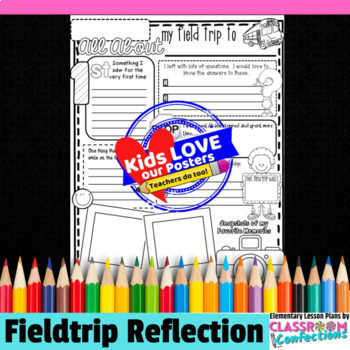
Field Trip Reflection Worksheet : Field Trip Writing Activity 3rd 4th 5th Grades
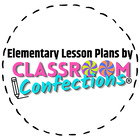
Field Trip Reflection and Memories

- Easel Activity
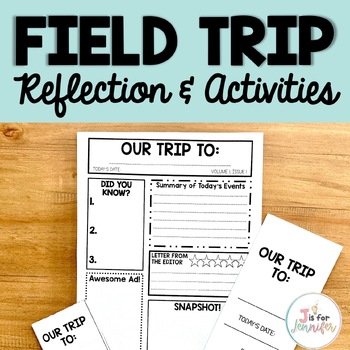
Field Trip Reflection and Activities

After Field Trip Writing Activity and Reflection - Scaffolded Report Writing

Field Trip Reflection
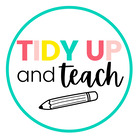
Virtual Field Trip Reflection Worksheet
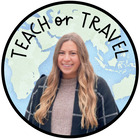
Field Trip Reflection Form | Virtual Field Trip Reflection Form
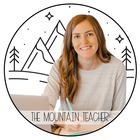
Field Trip Reflection and Activity
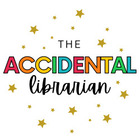
Field Trip Reflection Worksheets for Kindergarten and First Grade

Field Trip Reflection Forms Worksheet | School Trip | Activity |
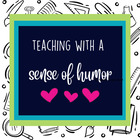
Field Trip Reflection - Great for Virtual Learning

Field Trip Reflection - Includes My First Field Trip

Field Trip Permission Slip Editable & Field Trip Reflection Sheets

EDITABLE field trip reflection before after fieldtrip art writing activity easy

- Google Slides™
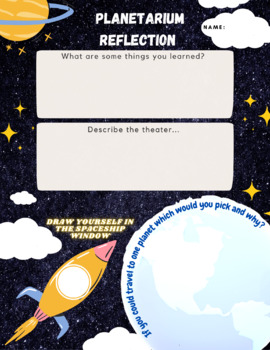
Planetarium Field Trip Reflection

- Portable Network Graphics
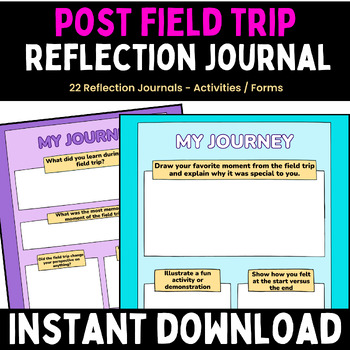
Field Trip Reflection Worksheets , Drawing & Writing Activities
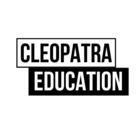
Field Trip Reflection Sheets
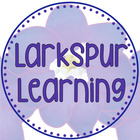
Washington DC Field Trip Reflection Packet

- Word Document File
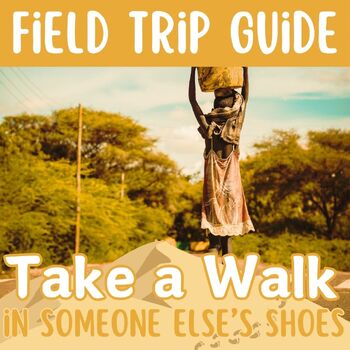
A Long Walk to Water Field Trip Experience & Reflection Worksheet

Field Trip Reflection Worksheet: Field Trip Writing Activity
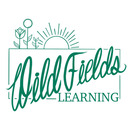
Zoo Field Trip Writing Activities | Opinion | Reflection

- We're hiring
- Help & FAQ
- Privacy policy
- Student privacy
- Terms of service
- Tell us what you think

IMAGES
VIDEO
COMMENTS
The impact field trips have on students often has to do with how they engage with the information they learn. Incorporating a field trip reflection worksheet helps students focus on what's important to them and what it means for their learning and life. Get the free Field Trip Reflection Worksheet by simply filling out the form on this page.
The field trip reflection booklet is a no-prep post field trip document that allows students to think about1. What they enjoyed and learned about on the trip .2. Create a T-shirt for the trip they experienced.3. Reflect critically on their behaviour during the outting.Enjoy! Subjects:
This is a cute booklet to use after a field trip. I run the 2 pages front to back on one sheet and then fold. ... Field Trip Reflection Booklet. Rated 4.83 out of 5, based on 11 reviews. 11 Ratings. 4,098 Downloads. Previous Next; Mrs Millers Teaching Mission . 345 Followers. Follow. Grade Levels. K - 5 th. Subjects. English Language Arts ...
The field trip reflection booklet is a no-prep post field trip document that allows students to think about1. What they enjoyed and learned about on the trip.2. Create a T-shirt for the trip they experienced.3. Reflect critically on their behaviour during the outting.Enjoy!
Strategies for educators to make the most of real world learning environments By Monica Burns. Hear more from Monica Burns and other innovative analysts, thought leaders, and educators at the 2018 Future of Education Technology Conference (FETC), January 23-26 in Orlando, Florida.Learn more here.. We all know the power of field trips, to open up students to the world outside the classroom, to ...
Field Trip Reflection Classroom Activity Your students' Field Trip with Inside the Outdoors will create many memories for them. A great way to capture these memories is in a writing reflection of their trip. SYNOPSIS Students will write an explanatory essay to describe their experience at their Inside the Outdoors Field Trip. OBJECTIVES
A field trip log is a structured document or booklet for students during educational outings. It enables them to record observations, thoughts, and learnings in real time. ... By encouraging active participation and reflection, the field trip log enhances the trip's educational value, making learning more interactive and memorable.
Name: _____ Field Trip Reflection Date:_____ Where?: _____ What was your favorite part of the trip? _____ _____ _____ Why?
Available on the Plus Plan. A worksheet to prompt reflection on a class field trip. Ask your students to complete this worksheet to reflect on a recent field trip experience. This wonderful worksheet provides your students with the opportunity to link the activities they participated in with their in-class learning and feeds your future lesson ...
In this set of free field trip printables, I included a narrative prompt for them to describe their day and then a persuasive prompt for them to write about their opinion of the trip. I also give my students some guidelines with this prompt, such as you must include 3 facts you learned about the topic, or you must describe 2 learning ...
Printable Field Trip Log - There are two versions of this log. One that you can print out and write on, or an editable version where you can write directly on the computer. Field Trip Log - This field trip log has spaces for 11 field trips. You can record them by subject and by how many hours you spent on that field trip for that subject.
Available on the Plus Plan. A worksheet to prompt reflection on a class field trip. Ask your students to complete this worksheet to reflect on a recent field trip experience. This wonderful worksheet provides your students with the opportunity to discuss how they felt about the day and reflect on their favorite activity.
the 'Theory of Mind' deals with egocentrism and the inability for the child to understand. other children's emotions. Dr. Ernsperger stressed making the child make choices. She stressed that it will. help with behavior problems if you let the children choose what their reward/punishment. would be.
The next time your class takes a field trip someplace, use this Field Trip Worksheet for 6th-8th Grade students to see what your students have learned from the excursion. Field trips, aside from offering your students time out of the classrooms, serve as an opportunity for them to learn something new that they might not have learned being in the classroom. And with the help of this activity ...
Too often, field trips are seen a culmination or a reward at the end of a unit/year. When this happens, we cut the learning short. Upon returning from field trips there must be follow-up ...
Field Trip Research. Directions: Using the location of your field trip's main website, answer the questions about where you are going. 1. What is the URL of the field trip location's main website? 2. Describe one of the main attractions or exhibits at the field trip location. 3. What are you most looking forward to about this field trip ...
A perfect fit for a big group of travellers: apartment «UytHome on boulevard 60-letiya Pobedy» is located in Elektrostal. This apartment is located in 3 km from the city center.
This booklet provides students with opportunities to write and sketch during the field trip! It also provides a reflection component that students can do when they return. It is set up to be able to print two sets however single side only.
This booklet has been designed to go with ANY field trip or excursion. It contains a range of activities to complete; before, during and after the field trip excursion. A great way to keep students engaged with little effort! ... Field Trip Excursion Reflection and Worksheets Booklet. Rated 5 out of 5, based on 10 reviews ...
MTM Hostel is located in Elektrostal. This hostel is located 2 km from the city center. You can take a walk and explore the neighbourhood area of the hostel — ZIL Culture Center, VDNKh and Saint Basil's Cathedral.
Book 1,199,000+ Hotels, Apartments, B&B and Hostels! US$ Hotel's currency; US$ USD A$ AUD C$ CAD £ GBP € EUR S$ SGD руб RUB; English. English Deutsch Italiano
Browse field trip reflection resources on Teachers Pay Teachers, a marketplace trusted by millions of teachers for original educational resources.
Book now. There are 4 ways to get from Ryazan to Elektrostal by train, bus, taxi, or car. ... Top Japan travel tips by Beatrix Holland - to help you get the most out of your next trip. Elektrostal, Russia (opens in a new window) Elektrostal is a city in Moscow Oblast, Russia, located 58 km east of Moscow. Population: 135,000 (1977); 123,000 ...